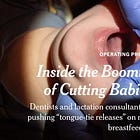Pediatricians Sound the Alarm on Tongue- Ties (Still Cool With Weenie Cutting Tho)
Most pediatricians have never helped a woman troubleshoot breastfeeding, so why do they insist on their expertise?
The AAP came out with a new report on tethered oral tissues and tongue tie release at the end of July 2024 and we need to talk about it.
Lactation professionals are pissed about it and I don’t blame them. Primarily because pediatricians have put their own expertise at the center of a subject of which they have barely any training in while at the same time, SURPRISE, dismissing women’s pain.
The AAP guidance was likely spurred by the explosion of tongue tie diagnosis and revisions. The paper cites a 10 fold increase between 1997 and 2012. It’s estimated that only 8% of babies under one have a mild tongue tie. For the uninitiated, a tongue tie is a condition that limits tongue movement due to a short or tight lingual frenulum, that little piece of skin that connects your tongue to the bottom of your mouth. If your baby can’t stick their tongue past their lower lip, there’s likely a tongue tie. If you traipse around the lactation world like we do, it seems like something closer to 80% of babies have tongue ties and almost any one can jump in there to fix it: dentists, pediatricians, midwives, etc. So it was bound to happen that the medical establishment was gonna weigh in.
Let’s break down the main points. The AAP report says:
The frenulum is normal anatomy and when it affects breastfeeding it’s called “symptomatic ankyloglossia”
Most breastfeeding problems are not caused by tongue tie
There are no agreed upon diagnostic criteria for a tongue tie, nor are there accepted best practices for treatment or aftercare
Pediatricians should be the first to diagnose the tongue tie then they should
should work together with lactation consultants to assess
There isn’t any evidence that aftercare stretches or release of labial (lip) or buccal (cheek) ties is warranted
So why the increase in babies with tongue ties? It’s really hard to tell if it’s because women are trying to breastfeed and social media makes it easier for people to get ideas and information that may alleviate some of their breastfeeding pain or whether there or if some gestational difference in babies that is making these tongue tie revisions necessary (there’s a theory that the increase of folic acid in our food, on top of the folate pregnant women take could be causing the abnormality) or if it’s over-diagnosis and dentists and other practitioners wanting to cash in. The NYT definitely reported it being the latter.
Here’s my take, by the mid 1970s, breastfeeding was at an all time low, with less than 25 percent of women even bothering to initiate nursing. So with the steady rise of breastfeeding initiation rates, we’re now roughly 85% percent, so you’re going to have an increase in problems.
The problem with our postpartum culture is that everything is for sale, so some providers like dentists are just taking advantage of the grift and not even offering full spectrum, collaborative support between care providers like lactation consultants and pediatricians (also another point I agree with). What I take issue with is the AAP’s “triage of care” which stipulates the first person who should determine or diagnose if a baby has a tongue tie is the pediatrician.
Pediatrician’s typically have less than 12 hours of lactation training, none of it being hands-on. Unless the MD is also an IBCLC, you’re not talking to an expert. You’re talking to someone who maybe paid attention to a powerpoint in Med School and attends conferences sponsored by formula manufacturers.
Here’s the other issue: pain is typically the top reason why women quit breastfeeding prematurely. The one documented benefit tongue tie releases have the most evidence for, according to the AAP paper, is reducing maternal pain while breastfeeding. But for some reason that’s not good enough for the AAP. By the way, there’s “no evidence” that special formula is better than breastmilk for babies with symptoms of reflux or colic, but pediatricians seem to have no issue recommending that! It seems there is a lot of resistance towards finding a new way to help moms that doesn’t involve handing a can of free formula over.
But speaking of evidence, the AAP is horny for it.
According to them, there is “insufficient evidence” for just about everything when it comes to tongue tie.
There is not enough evidence to say whether a laser or scissors is better.
No evidence for recommendation of stretching the wound after the release is done.
No research on osteopathic or bodywork in relation to improving tongue tie release.
None of the tools professionals use to grade tongue ties lille the Kotlow or the Hazelbker are “validated”
There may not be evidence that all these things help, but in case you didn’t notice, moms are struggling with breastfeeding!! The paper even goes on to have a whole other section about how the research studies on this topic are difficult and that the studies are poorly designed and hard to carry out. No wonder there’s no evidence!! They say that in all of the RCT trials they never follow the control group for any length of time, making it hard to say whether or not the frenotomy benefited the infants in the treatment group.
No great research studies, no standard of care and no evidence about alternative approaches to reducing maternal pain and improving latch. The AAP’s solution?
Basically brush tongue tie diagnosis and use a catch all “we need more research” in order to do so. “We need more research but we most likely dismiss the evidence as “not good quality” when it does come out. Then 20 years later maybe we will acknowledge the facts about tongue tie- but until then there will be millions of women who struggle with breastfeeding and who’s concerns are dismissed.”
Cool, sounds good!
In my view, even though some of these treatments have “no evidence”- are they harmful? The paper acknowledges that tongue tie release is a very low risk procedure. I wouldn’t say that osteopathic or cranial sacral therapy really is going to hurt- in fact evidence DOES say they can help with latching issues.
So what’s the hurt with moms looking into these treatments and taking their baby’s health into their own hands in order to optimize feeding and meet their breastfeeding goals? The AAP wants pediatricians to be the Czar under which all feeding, sleeping and care decisions are made by parents. I understand that these therapies are sometimes expensive and inaccessible to parents, and I appreciate that they don’t want people to fall victim to expensive and unnecessary procedures. But it’s constantly the gatekeeping of information to the detriment of the well being of mothers and babies for me. From their continued demonization of cosleeping or education on safer cosleeping- to their refusal to consider alternative therapies like tongue tie release in order to help women breastfeed- it seems the AAP will do anything BUT explore options that may help increase breastfeeding rates. And this is a problem for millions of American women who still see pediatricians (plus Emily Oster) as the end all be all of parenting decisions (not you, Rad moms).
Let parents get all the information and hire who they want, regardless of if there are 20 RCTs to support that decision. If it gets more moms to breastfeed with less pain the benefits may be worth it.







As someone who has observed tongue tie release procedures for babies AND assisted with circumcisions as a nurse AND had a tongue tie release procedure myself as an adult, it makes literally no sense for people to be on board with mass circumcisions for cosmetic reasons and be against tongue tie releases. There is clearly either a disconnect of education/information or they feel they are losing control and it is a power grab.
I get that you’re trying to bring some balance and nuance to the issue, but what about the babies?
Cutting a very sensitive area of the body that has a lot of nerve endings on a routine basis seems barbaric.
I have heard of babies actually be very distressed after the procedure and have no real change in breastfeeding outcomes.
It’s a real trauma to a very young child and we should consider how necessary it is.
It does seem to be over diagnosed which means Mums are allowing practitioners to perform unnecessary painful and potential traumatic procedures because they’ve been led to believe this will benefit a child. Much like circumcision was sold as a ‘hygienic’ practice that will benefit boys in the future.
Moreover, with such a sudden jump in the prevalence of a once rare ‘condition’, I think it’s perfectly reasonable to question why this would be the case? It seems suspect that every second newborn needs to be snipped.
My son was diagnosed with a tongue tie by two seperate practitioners but so were several new born children of parents I knew, which made me question the diagnosis. A few of us decided not to intervene and have gone on to have successful breasts feeding journeys of nearly 2 years.
All this is to say, medical procedure are not without their risks, including this one. And we shouldn’t downplay subjecting young babies to unnecessary pain, even if it ‘helps the mother’.